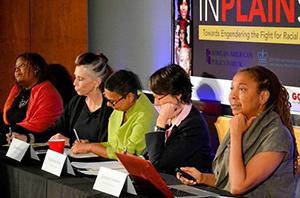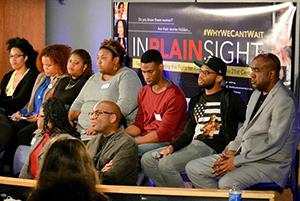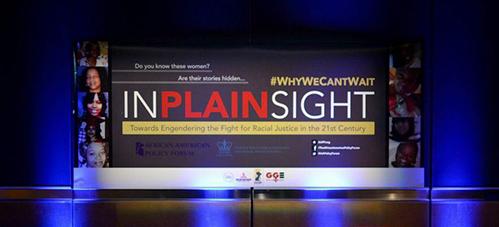Are the Challenges of Women of Color Hiding In Plain Sight?
Professor Kimberlé Crenshaw Moderates a Summit on Understanding How the Intersection of Gender and Racial Discrimination Impacts Women of Color.
New York, November 29, 2014—Scholars, journalists, advocates, and activists gathered at a summit to discuss how thought-leaders and policymakers can be more responsive to women of color who face structural discrimination based on both race and gender.
“In Plain Sight: Towards Engendering the Fight for Racial Justice in the 21st Century” was sponsored by Columbia Law School’s Center for Intersectionality and Social Policy Studies in partnership with the African American Policy Forum (AAPF), and comprised several diverse panel discussions and a “hearing” where witnesses shared personal stories of inequities they have encountered. After listening to this testimony, seasoned justice advocates acting as “commissioners” contextualized those experiences in terms of larger social structures and forces. Professor Kimberlé Crenshaw, director of the center and co-founder of the AAPF, moderated the event, which took place at Columbia Law School.
| Professor Kimberlé Crenshaw, right, serves as a "commissioner" contextualizing social injustice. |
Even in the ostensibly feminist and anti-racist realm of social justice advocacy, Crenshaw and other experts argued, the experiences of minority women are too often marginalized. Issues including state sanctioned violence, mass incarceration, domestic violence, economic inequality, homelessness, immigration policies, and anti-terror surveillance burden women differently than men, and demand a deeper discussion.
Speakers at the Nov. 1 event included activists such as Aleta Alston-Toure of the Free Marissa Alexander Campaign and Ferguson resident Ashley Yates of Millennial Activists United; notable advocates such as Andrea Ritchie and Nimmi Gowrinathan; and research scholars including Heidi Hartmann. “Witnesses” such as Taylonn Murphy, father of fallen basketball star Tayshana Murphy, and Lady Kathryn Williams, domestic violence survivor, offered testimony to experts including Farah Tanis of Black Women’s Blueprint, Catherine Mackinnon of Harvard Law School, Laura Flanders of GRITtv, Indian sex trafficking activist Ruchira Gupta, columnist Mychal Denzel Smith, and Barbara Arnwine of the Lawyers' Committee for Civil Rights Under Law.
Among those who shared their stories were Patreese Johnson and Terrain Dandridge, two of the defendants in the New Jersey 4 case. Johnson recalled spending over seven years in jail after she and six other African-American lesbian friends defended themselves from a man who, she alleges, had “thrown a lit cigarette at us and spat at us…. He choked us, pulled out our dreds, called us all types of names, gave us all black eyes.” Johnson added that the man had threatened to sexually assault them because of their sexual orientation. Yet the women were charged with gang assault and attempted murder, while the alleged assailant, an African-American man, escaped charges.
“The media dehumanized us” said Johnson. “They called us vultures, a wolf pack of lesbians. We had no chance, we were found guilty before we even went to trial.”
“The media dehumanized us” said Johnson. “They called us vultures, a wolf pack of lesbians. We had no chance, we were found guilty before we even went to trial.”
Lisa Brunner, a member of the White Earth Ojibwe Nation in Minnesota and the executive director of the Sacred Spirit First Nations Coalition, testified about rampant sexual violence against Native American women that has created a troubling sense of inevitability.
| Participants share and hear testimony considering inequities at the intersection of race and gender. |
Other speakers included Ashley Yates and Johnetta Elzie, two young women who have been organizing protests in Ferguson since the death of Michael Brown in August. Yates and Elzie testified about their own experiences confronting police, and about making women and girls more visible and powerful in grassroots efforts to prevent police violence. They noted that women are heavily involved at the front lines of protests in Ferguson, but underrepresented in leadership and agenda-setting meetings.
Throughout the day, compelling testimonies ranged from heart wrenching experiences to rousing appeals for a more expansive vision of social justice. Sunita Patel spoke about how women who have illegally entered the U.S. face a variety of stereotypes demeaning how they choose to raise their children, while Elena Ruiz argued that President Obama’s focus on stabilizing minority families clashes with his deportation policies. Ruiz echoed the criticisms of many immigration activists who have labeled him the “Deporter in Chief.”
The town hall meeting concluded with a roundtable conversation among organizers of #WhyWeCantWait, a campaign calling for the inclusion of girls and young women of color in the president’s My Brother’s Keeper initiative. The #WhyWeCantWait campaign galvanized a movement earlier this year after the release of two open letters to Obama. The conversation, which included a question and answer session, tracked concerns expressed by the hundreds who signed the letters.
The town hall meeting concluded with a roundtable conversation among organizers of #WhyWeCantWait, a campaign calling for the inclusion of girls and young women of color in the president’s My Brother’s Keeper initiative. The #WhyWeCantWait campaign galvanized a movement earlier this year after the release of two open letters to Obama. The conversation, which included a question and answer session, tracked concerns expressed by the hundreds who signed the letters.
Participants argued that male-exclusive initiatives like My Brother’s Keeper arbitrarily exclude women and girls and ignore systemic and institutional forms of discrimination. They said women of color face many barriers, some the same as those faced by their male counterparts and others markedly different. All of these conditions matter at the grassroots level and in policy development, according to Brittney Cooper, one of the organizers of Black Lives Matter, a national campaign to support the movement against state sanctioned violence in Ferguson.
“I’m not willing to live with a legacy that says black girls don’t matter,” Cooper stated. “We don’t have liberation if we don’t include women and girls of color, trans and cis.”
Over the past year, AAPF has partnered with a variety of organizations to produce hearings in cities across the country, including Atlanta, Chicago, Los Angeles, and, most recently, New York City. Partners have included Girls for Gender Equity in New York, the Critical Race Studies at UCLA School of Law, and CADRE and the Children’s Legal Defense Fund in Los Angeles. Past hearings have focused on girls and young women, but “In Plain Sight,” was the first to focus on adult women of color and their unique challenges.
“I’m not willing to live with a legacy that says black girls don’t matter,” Cooper stated. “We don’t have liberation if we don’t include women and girls of color, trans and cis.”
Over the past year, AAPF has partnered with a variety of organizations to produce hearings in cities across the country, including Atlanta, Chicago, Los Angeles, and, most recently, New York City. Partners have included Girls for Gender Equity in New York, the Critical Race Studies at UCLA School of Law, and CADRE and the Children’s Legal Defense Fund in Los Angeles. Past hearings have focused on girls and young women, but “In Plain Sight,” was the first to focus on adult women of color and their unique challenges.


